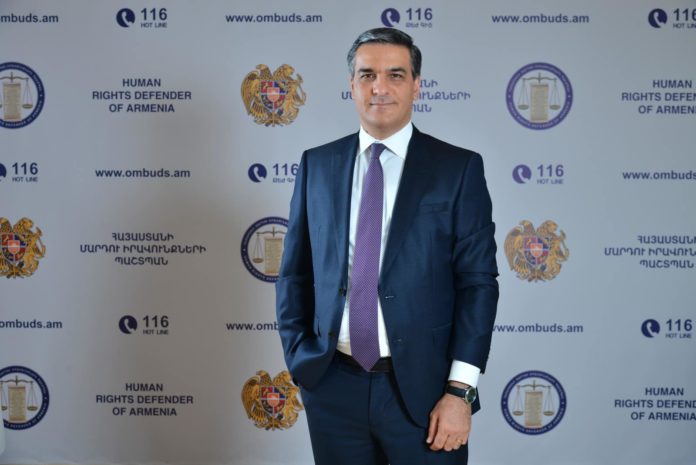WATERTOWN — Dr. Arman Tatoyan, Ombudsman or Human Rights Defender of Armenia, spoke at the Armenian Democratic Liberal Party (ADL) press forum via Zoom on February 23, the last day of his six-year term in office, on Azerbaijan’s Armenophobic policies and ongoing violations of human rights. Sevag Hagopian, editor of the ADL newspaper Zartonk of Beirut, introduced the speaker to the audience.
Tatoyan was elected the Ombudsman of Armenia by the Armenian parliament in February 2016, two years before the “Velvet Revolution” and the coming to power of Nikol Pashinyan. The 40-year-old has three degrees from the law faculty of Yerevan State University (Bachelor of Law, Master of Jurisprudence, and Doctor of Law), concluding his studies there in 2007. He also obtained a master’s degree in law in 2013 from the University of Pennsylvania Law School. Prior to serving as Ombudsman he was adviser to the chair of the Criminal Chamber Cassation Court of Armenia (2007), the legal officer for the South Caucasus Anti-Drug Regional Program, V Phase, at the United Nations Development Program (2010), adviser at the Constitutional Court of the Republic of Armenia (2012-13), and a member for Armenia on the Committee for the Prevention of Torture (CPT) of the Council of Europe at various times since 2011. He has served as ad hoc judge in the European Court of Human Rights and has taught as a lecturer in several Armenian universities.
A rapid and passionate speaker, Tatoyan related that he and his office conducted fundamental investigations during and after the war concerning the Armenophobic policies of the Azerbaijani government, and published a report based on evidence. He said that it indicates that nothing has decreased since the war, with the same hostile approach based on national and religious identity.
Tatoyan stated the religious element of this enmity has increased. For example, he said that Armenian war captives were tortured partly on a religious basis. When they saw a cross tattooed on the hand of a captive, they burnt it off. Whoever was wearing a cross was killed. Whoever was baptized was treated more severely. In one case, Azerbaijanis burned captives’ feet, forcing them to accept Islam.
Tatoyan observed that the president of Azerbaijan last September called upon the Muslim world basically for revenge, accusing Armenians of Islamophobia and Azerbaijan-phobia. Yet, he said, this accusation is false. In his report, he traced good relations of Armenians with Muslims back to the 7th century and related the good relations today of Armenians in many predominantly Muslim countries.
Though on the one hand, Armenia has preserved the Iranian Blue Mosque, which operates in Yerevan, and Armenians renovated several mosques in Shushi, Tatoyan said, the Baku Armenian Church has been completely desecrated and many Armenian churches are being destroyed by Azerbaijan after the 2020 war. Furthermore, when two Azerbaijani representatives recently visited Yerevan, they went to the Blue Mosque, and wrote something to the effect that we have come to the Blue Mosque on our historic Azerbaijani land and hope that the true owners will come in the future.










